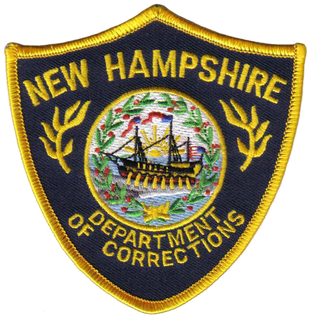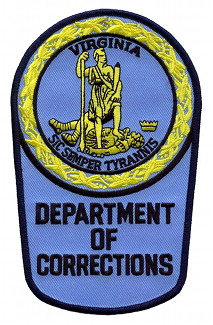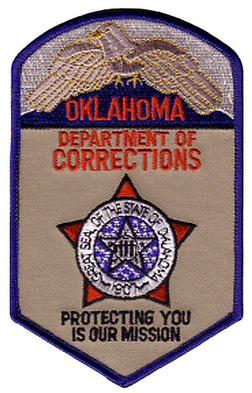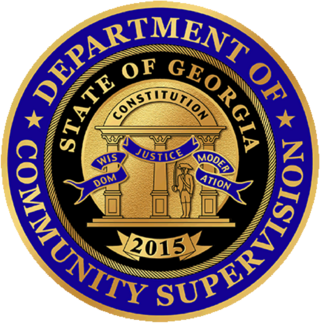Related Research Articles

In criminal justice, particularly in North America, correction, corrections, and correctional, are umbrella terms describing a variety of functions typically carried out by government agencies, and involving the punishment, treatment, and supervision of persons who have been convicted of crimes. These functions commonly include imprisonment, parole, and probation. A typical correctional institution is a prison. A correctional system, also known as a penal system, thus refers to a network of agencies that administer a jurisdiction's prisons, and community-based programs like parole, and probation boards. This system is part of the larger criminal justice system, which additionally includes police, prosecution and courts. Jurisdictions throughout Canada and the US have ministries or departments, respectively, of corrections, correctional services, or similarly-named agencies.
A parole board is a panel of people who decide whether an offender should be released from prison on parole after serving at least a minimum portion of their sentence as prescribed by the sentencing judge. Parole boards are used in many jurisdictions, including the United Kingdom, the United States, and New Zealand. A related concept is the board of pardons and paroles, which may deal with pardons and commutations as well as paroles.
A law enforcement officer (LEO), or peace officer in North American English, is a public-sector employee whose duties primarily involve the enforcement of laws. The phrase can include campaign disclosure specialists, local police officers, prosecutors, municipal law enforcement officers, health inspectors, SWAT officers, customs officers, lawyers, state troopers, federal agents, secret agents, special investigators, coast guards, border patrol officers, judges, district attorney, bounty hunters, gendarmerie officers, immigration officers, private investigators, court officers, probation officers, parole officers, arson investigators, auxiliary officers, animal control officers, game wardens, park rangers, county sheriff's deputies, constables, marshals, detention officers, correction officers, sworn campus police officers and public safety officers. Security guards are not law enforcement officers, unless they have been granted powers to enforce particular laws, such as those accredited under a community safety accreditation scheme such as a security police officer.
A reformatory or reformatory school is a youth detention center or an adult correctional facility popular during the late 19th and early 20th centuries in Western countries. In the United Kingdom and United States, they came out of social concerns about cities, poverty, immigration, and gender following industrialization, as well as from a shift in penology to reforming instead of punishing the criminal. They were traditionally single-sex institutions that relied on education, vocational training, and removal from the city. Although their use declined throughout the 20th century, their impact can be seen in practices like the United States' continued implementation of parole and the indeterminate sentence.

The California Department of Corrections and Rehabilitation (CDCR) is the penal law enforcement agency of the government of California responsible for the operation of the California state prison and parole systems. Its headquarters are in Sacramento.

The Tennessee Department of Correction (TDOC) is a Cabinet-level agency within the Tennessee state government responsible for the oversight of more than 20,000 convicted offenders in Tennessee's fourteen prisons, three of which are privately managed by the Corrections Corporation of America. The department is headed by the Tennessee Commissioner of Correction, who is currently Frank Strada. TDOC facilities' medical and mental health services are provided by Corizon. Juvenile offenders not sentenced as adults are supervised by the independent Tennessee Department of Children's Services, while inmates granted parole or sentenced to probation are overseen by the Department of Correction (TDOC)/Department of Parole. The agency is fully accredited by the American Correctional Association. The department has its headquarters on the sixth floor of the Rachel Jackson Building in Nashville.

The New Hampshire Department of Corrections is an executive agency of the U.S. state of New Hampshire; charged with overseeing the state correctional facilities, supervising probation and parolees, and serving in an advisory capacity in the prevention of crime and delinquency. As of June 30, 2013, the Department had an inmate population of 2,791, 15,267 on probation or parole, and 893 total employees, 470 as corrections officers and 64 as probation/parole officers. The agency has its headquarters in Concord.

The Virginia Department of Corrections (VADOC) is the government agency responsible for community corrections and operating prisons and correctional facilities in the Commonwealth of Virginia in the United States. The agency is fully accredited by the American Correctional Association and is one of the oldest functioning correctional agencies in the United States. Its headquarters is located in the state capital of Richmond.

The Massachusetts Correctional Institution at Concord (MCI-Concord) is a medium security prison for men located in Concord, Massachusetts in the United States. Opened in 1878, it is the oldest running state prison for men in Massachusetts. This prison is under the jurisdiction of the Massachusetts Department of Correction. There are 570 inmates with a total capacity of 614 general population beds.
The Oklahoma State Reformatory is a medium-security facility with some maximum and minimum-security housing for adult male inmates. Located off of State Highway 9 in Granite, Oklahoma, the 10-acre (4.0 ha) facility has a maximum capacity of 1042 inmates. The medium-security area accommodates 799 prisoners, minimum-security area houses roughly 200, and the maximum-security area with about 43 inmates. The prison currently houses approximately 975 prisoners. The prison was established by an act of the legislature in 1909 and constructed through prison labor, housing its first inmate in 1910. The facility is well known for the significant roles women played in its foundation and governance, most notably having the first female warden administer an all-male prison in the nation.

Kentucky State Reformatory (KSR) is a medium-security prison for adult males. The prison is located in unincorporated Oldham County, Kentucky, near La Grange, and about 30 miles (48 km) northeast of Louisville. It opened in 1940 to replace the Kentucky State Penitentiary in Frankfort after a flood damaged the original property. The current (2020) capacity of KSR is 1053 inmates.

The Oklahoma Department of Corrections is an agency of the state of Oklahoma. DOC is responsible for the administration of the state prison system. It has its headquarters in Oklahoma City, across the street from the headquarters of the Oklahoma Department of Public Safety. The Board of Corrections are appointees: five members are appointed by the Governor; two members are appointed by the President Pro Tempore of the Senate; and two members are appointed by the Speaker of the house of Representatives. The board is responsible for setting the policies of the Department, approving the annual budget request, and working with the Director of Corrections on material matters of the agency. T. Hastings Siegfried is the current chairman of the board. The director, who serves at the pleasure of the governor, is the chief executive of the department. The current director of Corrections is Scott Crow, who was appointed after Director Joe Allbaugh resigned his post on June 13, 2019. Crow was confirmed by the Oklahoma State Senate as director in May 2020.

The Department of Public Safety and Corrections (DPS&C) is a state law enforcement agency responsible for the incarceration of inmates and management of facilities at state prisons within the state of Louisiana. The agency is headquartered in Baton Rouge. The agency comprises two major areas: Public Safety Services and Corrections Services. The secretary, who is appointed by the governor of Louisiana, serves as the department's chief executive officer. The Corrections Services deputy secretary, undersecretary, and assistant secretaries for the Office of Adult Services and the Office of Youth Development report directly to the secretary. Headquarters administration consists of centralized divisions that support the management and operations of the adult and juvenile institutions, adult and juvenile probation and parole district offices, and all other services provided by the department.
The Georgia State Board of Pardons and Paroles is a five-member panel authorized to grant paroles, pardons, reprieves, remissions, commutations, and to remove civil and political disabilities imposed by law. Created by Constitutional amendment in 1943, it is part of the executive branch of Georgia's government. Members are appointed by the governor to staggered, renewable seven-year terms subject to confirmation by the State Senate.

The New York State Division of Parole was an agency of the government of New York within the New York State Correctional Services from 1930 to 2011. § 259. "1. There shall be in the executive department of state government a state division of parole" responsible for parole, the supervised release of a prisoner before the completion of his/her sentence. In 2011, the agency merged with the Department of Correctional Services to form the New York State Department of Corrections and Community Supervision.
The Texas Board of Pardons and Paroles (BPP) is a state agency that makes parole and clemency decisions for inmates in Texas prisons. It is headquartered in Austin, Texas.
The Tennessee Board of Parole, formerly known as the Tennessee Board of Pardons and Paroles and Tennessee Board of Probation and Parole, is the state parole board in Tennessee.

The Wisconsin Department of Children and Families (DCF) is an agency of the Wisconsin state government responsible for providing services to assist children and families and to oversee county offices handling those services. This includes child protective services, adoption and foster care services, and juvenile justice services. It also manages the licensing and regulation of facilities involved in the foster care and day care systems, performs background investigations of child care providers, and investigates incidents of potential child abuse or neglect. It administers the Wisconsin Works (W-2) program, the child care subsidy program, child support enforcement and paternity establishment services, and programs related to the federal Temporary Assistance to Needy Families (TANF) income support program.

The Georgia Department of Community Supervision (DCS) is an executive branch agency of the U.S. state of Georgia. DCS is headquartered in the James H "Sloppy" Floyd Veterans Memorial Building with additional field offices throughout the state. DCS is tasked with: the supervision and reentry services of felony probationers and parolees; the oversight of adult misdemeanor probation providers; and, provides administrative support to the Georgia Commission on Family Violence (GCFV).
The Ministry of the Solicitor General is the ministry in the Government of Ontario responsible for public security, law enforcement and policing, emergency management, correctional and detention centres/jails and organizations such as the Ontario Provincial Police, Emergency Management Ontario, and the Office of the Fire Marshal.